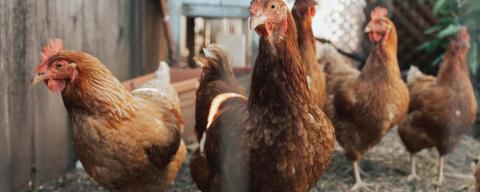SHARE
Highly pathogenic H5 avian influenza (HPAI) has recently been discovered in wild birds in New Hampshire and was discovered in small poultry flocks in Maine. Are you practicing good biosecurity to protect your flock? Help protect New England’s poultry industry by following these safety practices.
Prevent Disease
- Practice good biosecurity
- Minimize exposure to wild birds
- Carefully watch your flock
Report Signs of Disease
- Your local veterinarian
- State Veterinarian, 603-271-2404
- Local USDA office
- Local Cooperative Extension office
While HPAI is very contagious among birds, the recent HPAI detection does not present an immediate public health concern. Read "Recent Bird Flu Infections in U.S. Wild Birds and Poultry Pose a Low Risk to the Public" from the U.S. CDC
Know the Warning Signs
Early detection of signs is very important to prevent the spread of disease.
- Sudden death without clinical signs
- Lack of energy and appetite
- Decreased egg production
- Thin-shelled, soft-shelled, or misshapen eggs
- Swelling of the head, eyelids, comb, wattles, and hocks
- Purple discoloration of the wattles, comb, and legs
- Nasal discharge, coughing, sneezing
- Lack of coordination
- Diarrhea
- Tremors, drooping wings, circling, twisting of the head and neck or lack of movement
